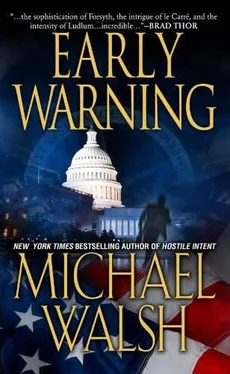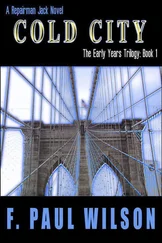Michael Walsh - Early Warning
Здесь есть возможность читать онлайн «Michael Walsh - Early Warning» весь текст электронной книги совершенно бесплатно (целиком полную версию без сокращений). В некоторых случаях можно слушать аудио, скачать через торрент в формате fb2 и присутствует краткое содержание. Жанр: Триллер, на английском языке. Описание произведения, (предисловие) а так же отзывы посетителей доступны на портале библиотеки ЛибКат.
- Название:Early Warning
- Автор:
- Жанр:
- Год:неизвестен
- ISBN:нет данных
- Рейтинг книги:3 / 5. Голосов: 1
-
Избранное:Добавить в избранное
- Отзывы:
-
Ваша оценка:
- 60
- 1
- 2
- 3
- 4
- 5
Early Warning: краткое содержание, описание и аннотация
Предлагаем к чтению аннотацию, описание, краткое содержание или предисловие (зависит от того, что написал сам автор книги «Early Warning»). Если вы не нашли необходимую информацию о книге — напишите в комментариях, мы постараемся отыскать её.
Early Warning — читать онлайн бесплатно полную книгу (весь текст) целиком
Ниже представлен текст книги, разбитый по страницам. Система сохранения места последней прочитанной страницы, позволяет с удобством читать онлайн бесплатно книгу «Early Warning», без необходимости каждый раз заново искать на чём Вы остановились. Поставьте закладку, и сможете в любой момент перейти на страницу, на которой закончили чтение.
Интервал:
Закладка:
“Ihr Telefon,” demanded Vater Otto, who made the call, and that was that. Security forces would round them up shortly, the German family who had been harboring them would be shot, and life for the rest of them would go on. Emanuel knew better than to ask why them and why now. No matter how hard the regime, there were always cracks not only in the facade but in the floorboards. No matter how deep the hatred, there were always tasks that needed to be done, preferably by slave labor but when that was not up to snuff, then by the black market. There were always things that could be overlooked, until they couldn’t. This family, obviously, had been one of them.
Which is what Skorzeny didn’t understand. Why stay? Why wait? When doom is imminent, why not flee? And even at that age, he already knew the answer:
Because for most people it is easier to refuse to believe than to confront the truth.
It was not weakness, not stupidity nor cowardice nor even indolence, but the ancient human fallacy of believing that tomorrow will be pretty much like today, different in only the particulars but never in the general. Until one day it is not. And today, this early morning, that day had come for both Jew and Aryan.
He didn’t care. That day had come for him seven months ago and, as far as he was concerned, it could come for the rest of humanity and he would not shed so much as a tear.
That evening, his father took him to a tavern, where they both drank beer vom Fass and dined as best one could under the circumstances. Despite the nightly air raids over German air space, Dresden had been largely untouched and every day that the people woke up to an intact city was another day that convinced them the Allies would leave them alone. There were no military targets here, he could hear the women say in the marketplace, we are far from the front and the fighting.
There was more worry about the advancing Soviets than there was about the Americans or the British. Dresden was safe; indeed, he suspected, that was one of the reasons his father was here, planning the next operation, the next counter-strike. Dresden was the only place left in Germany where you could think.
His father didn’t drink much, but on this evening he ordered a second Mass for both of them. Emanuel could feel the first already going to his head, but didn’t want to be thought a sissy or a coward. He was sent here to learn, and learning is what he was doing.
“Also, Jungs,” his father began. “Wir müssen singen.”
Looking back on that moment, if you had asked to him to provide a suitable valedictory for his last moment with his father, that was hardly the one he would have chosen. Although Vater Otto was a man of almost no words-garrulousness was not a quality highly prized by the National Socialists-when he did speak he spoke to the point, so this notion of breaking into song was unusual.
At that moment the dream came back to him-that instant before thought and word, before his father could open his mouth in song, before the second beer had loosened his inhibitions just enough for him to hear the music. In that moment, instead of hearing the music, Emanuel saw the thing he had dreaded seeing since last summer, the thing that had been kept from his young eyes. The thing that, in his dream, had turned him into a monster unworthy even of ritual sacrifice:
Piano wire.
A more horrible way to die could hardly be imagined. Jesus on the Cross at Golgotha, writhing in His agonies, but on a wire. It was hanging, but worse. The garrote, but worse. Strangulation, but worse. It was Death, come calling, but worse, without the smiling face brimming with the false promise of surcease and repose, without-
Wer reitet so spät durch Nacht und Wind
Es ist der Vater mit seinem Kind
Er hat den Knaben wohl in den Arm
Er faßt ihn sicher, er hält ihn warm
Mein Sohn, was birgst du so bang dein Gesicht?
Siehst Vater Du den Erlkönig nicht?
Der Erlkönig mit Kron’und Schweif?
Mein Sohn, es ist ein Nebelstreif
– the Erlkönig’s seductive lullaby.
Everyone knew the words, of course. This was Germany, and the words were by Goethe. This was the greater Reich, and the music was by Schubert. Next to Gretchen am Spin-nrad, this was the song by Schubert that everybody knew, and so it was no surprise when first one man, then another and then another picked up his father’s tune, and then someone went to the inevitable, ubiquitous piano in the corner and began pounding out the triplets in the right hand and fingering the ominous bass in the left, the bass line that had spawned a hundred, no a thousand, silent-movie scores, the motif that signaled danger, destruction, and death, as symbolized by the Erl-King himself: lethal but seductive, and always fatal.
It brought the ghosts. To everyone in the room, the song brought the ghosts, in the form of the pleading boy, who begs his father to ride faster and faster, to escape the lullaby of the Erl-King,
“Oh, father do you not hear what the Erl-King whispers so close to my ear?”
But he could hear it. Could hear it through the singing and alcoholic haze, through the cigarette smoke. That voice that whispered so smoothly and so sinuously in his ear, the voice of temptation. He could hear. He could always hear it. It never left him. But he would be damned if it would kill him.
The men were just finishing up the song, the last verse…
Dem Vater grauset’s, er reitet geschwind,
Er hält in Armen das ächzende Kind,
Erreicht den Hof mit Müh’und Not;
In seinen Armen das Kind war tot.
…when he heard the air-raid sirens, and knew that the ghosts would soon once more be walking among them, the Erl-King leading them.
Friends would forsake you, but ghosts never would.
CHAPTER TWENTY-FIVE
42nd Street
Devlin had no idea who the black man was or who the white man was, and didn’t care, but it took him less than an instant to sort out the perp from the cop. As the man with the knife made his move, Devlin snaked out a hand and, with one powerful yank, dragged him into the shadows.
Deadweight was heavy, as every fireman knew. Much easier to lift a breathing 250-pound man than a dead 110-pound woman. The man with the knife was only half dead, which meant he was still slightly buoyant as Devlin yanked him into what had been a building entrance. As he’d learned long ago, you could always count on the cooperation of an obstreperous victim, who rather than resist would move toward you, to fight you, even though it would prove to be a fatal mistake, as indeed it did.
The knife was quickly knocked aside. Devlin applied the pressure of both thumbs to the base of the man’s throat, in the little hollow known as the supra-sternal notch; sexy on a woman, so vulnerable on a man. A sharp wrench of the neck and the job was done.
Which left the cop.
Devlin pulled a balaclava down over his face and approached the cop. He couldn’t risk exposure, but he didn’t want to leave the poor bastard there, bleeding. He had to get that shoulder wound cleaned, fast.
The cop was a lot faster than he looked. In a flash, he retrieved the old.38 and had it in the middle of Devlin’s chest. All it would take was a little pressure and Devlin would be gone.
He smashed the cop in his wounded shoulder, then clipped him on the jaw. From firsthand experience, he knew how much the blow to the bullet wound was going to hurt, and he counted on its causing the man to drop the gun or at least take his finger off the trigger. Thank God for double-action revolvers when the hammer was not cocked.
The cop sagged, then fell back. Quickly, Devlin got out a first-aid kit he had designed himself after years in the field. His flashlight had come in handy in New Orleans, and it was just as useful here: quickly, he cleaned the wound and tweezed out any foreign materials. Then he stabbed the cop with a quick hit of morphine, so that when he woke up, which wouldn’t be long, he wouldn’t hurt so much. And of course by then Devlin would be long gone.
Читать дальшеИнтервал:
Закладка:
Похожие книги на «Early Warning»
Представляем Вашему вниманию похожие книги на «Early Warning» списком для выбора. Мы отобрали схожую по названию и смыслу литературу в надежде предоставить читателям больше вариантов отыскать новые, интересные, ещё непрочитанные произведения.
Обсуждение, отзывы о книге «Early Warning» и просто собственные мнения читателей. Оставьте ваши комментарии, напишите, что Вы думаете о произведении, его смысле или главных героях. Укажите что конкретно понравилось, а что нет, и почему Вы так считаете.












